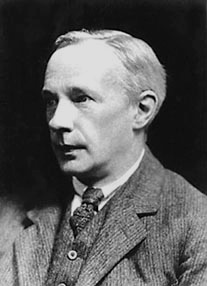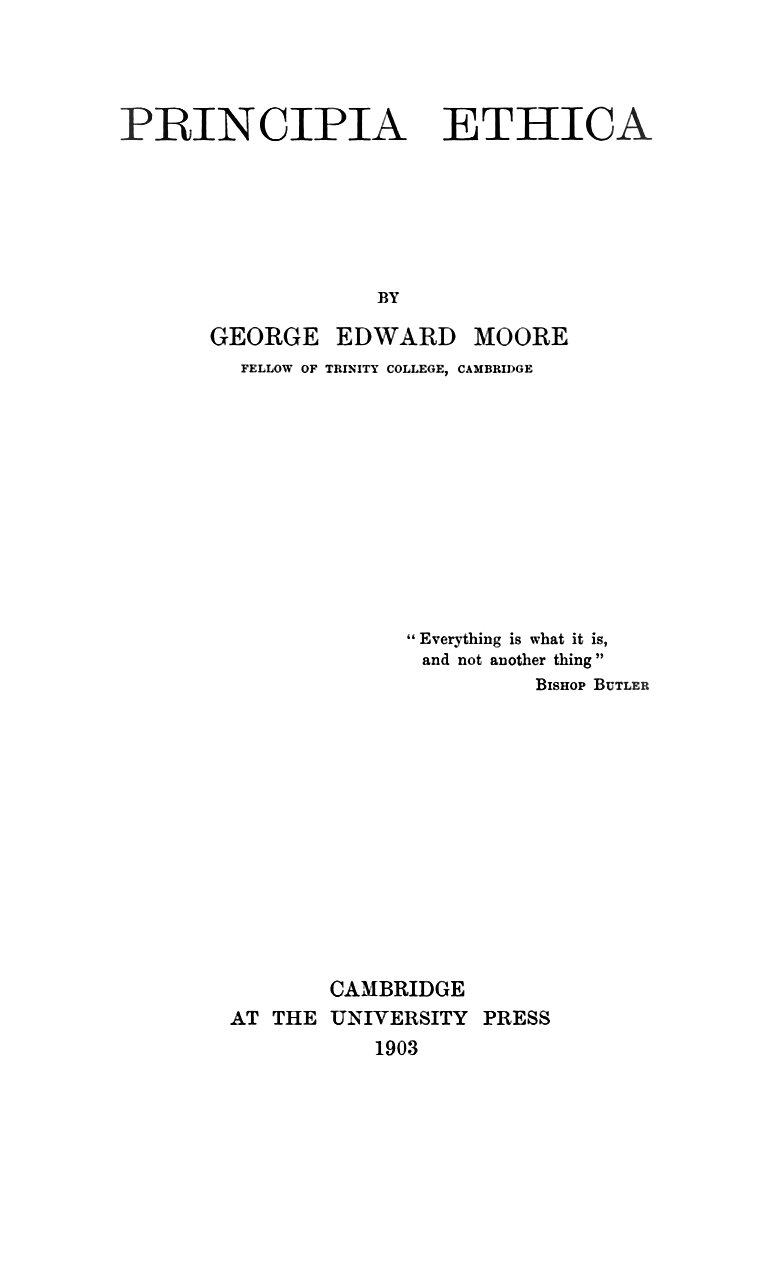★哲学的倫理学において、自然主義的誤謬とは、善を快や望ましいといった自然的性質で還元的に説明す ることは誤りであるという主張である。この用語は、イギリスの哲学者G. E. Mooreが1903年に出版した『プリンキピア・エチカ』の中で主張されたものである。 ムーアの自然主義的誤謬は、デイヴィッド・ヒュームの『人間本性論』(1738-40)に由来する「is-ought問題(〜である/〜べきである問 題)」と密接な関係にある。しかし、ヒュームのis-ought問題に対する見解とは異なり、ムーア(および倫理的非自然主義の他の支持者)は自然主義的 誤謬を道徳的実在論と対立するものとは考えていない。 自然主義的誤謬は、「何かが自然である、したがって、それは道徳的に受け入れられる」あるいは「この性質は不自然である、したがって、この性質は望ましく ない」といった推論の形で例示される自然への訴えを混同してはならない。このような 推論は、医学、セクシュアリティ、環境主義、性別役割分担、人種、カーニズム(肉食主義)などの議論によく見られるものである。
★「is-ought問題(〜である/〜べきである問題)」とは、デイヴィッド・ヒュームの 『人間本性論』のなかで主張される、「〜である」という言明は、「〜べきである」という主張とはまったく無関係である(にもかかわらず、「〜である」とい う言明はしばしば「〜べきである」と取り違えられる)。
自然主義的論法について(ジョージ・エドワード・ ムーア;George Edward Moore, 1873-1958)
| 「唯一の善が時間のうちに存在する諸々の事物のある 一性質に存すると主張する倫理学理論は「自然主義的」である。これらの理論がそのように主張するのは、 「善い」それ自体がそのような性質に照らして定義されうると考えるからである。そこで、このような理論の考察に取りかかる」 | §27 Those theories of Ethics, then, are "naturalistic" which declare the sole good to consist in some one property of things, which exists in time; and which do so because they suppose that "good" itself can be defined by reference to such a property. And we may now proceed to consider such theories. |
| 「最初にまず、もっとも有名な倫理原則の一つは「自 然 に従う生活」を勧めるものである。それはストア学派倫理学の原理であったが、この倫理学は形而上学的 と呼ばれる資格があるからここでは取り扱わない。しかし、同じ言い回しがルソーのうちに再び見出される。しかも、われわれのなすべきことは自然のままに生 きることであると今日でさえしばしば主張される。そこで、この主張をその一般的な形式において検証する。第一に、おそらく後に取り扱う形而上学的理論を拠 り所とする場合以外は、自然的なものがすべて善いと言うことはできない。これは明らかである。自然的なものがすべて一様に善いのであれば、そのときには一 般に理解されているような倫理学は確実に消滅する。なぜなら、倫理学的観点からすれば、あるものが悪であり、他のものが善であるということほど確かなこと はないからである。実際、倫理学の目的は主としてそれによって一方を回避し他方を確保することができる一般規則を与えることにある。ところで、自然のまま に生きるべしというこの忠告において、「自然的」とは何を意味しているのであろうか。その語は自然的であるすべてのものに当てはめることができないことは 明らかである。 | And, first of all, one of the most famous of ethical maxims is that which recommends a "life according to nature." That was the principle of the Stoic Ethics; but, since their Ethics has some claim to be called metaphysical, I shall not attempt to deal with it here. But the same phrase reappears in Rousseau; and it is not unfrequently maintained even now that what we ought to do is live naturally. Now let us examine this contention in its general form. It is obvious, in the first place, that we cannot say that everything natural is good, except perhaps in virtue of some metaphysical theory, such as I shall deal with later. If everything natural is equally good, then certainly Ethics, as it is ordinarily understood, disappears; for nothing is more certain, from an ethical point of view, than that some things are bad and others good; the object of Ethics is, indeed, in chief part, to give you general rules whereby you may avoid the one and secure the other. What, then, does "natural" mean, in this advice to live naturally, since it obviously cannot apply to everything that is natural? |
| 「この言い方は、自然的善というようなものがあると い う漠然とした観念を示しているように思われる。つまり、自然は、存在するものを確定し決定するのと同 じように、善なるものを確定し決定すると言うことができる、という信念を示している。たとえば、「健康」は自然的定義が可能であり、健康が何であるかを自 然が確定していると考えられることがある。また、健康は明らかに善いと言われる。したがって、この場合、自然がその問題を決定しているから、われわれは自 然のもとに赴いて健康が何であるかを尋ねさえすればよい。そうすれば、善が何であるかを知ることになり、倫理学を科学に基づかせることになる。しかし、こ の健康の自然的定義とは何であろうか。私が考えうるのは、健康が自然的用語によって有機体の正常な状態であると定義されるべきである、ということだけであ る。というのも、疑いもなく、病気もまた一つの自然的産物だからである。健康とは、進化によって保存されるものであり、生存競争においてそれを保有する有 機体を保存する傾向のあるものである、と言っても同じである。というのは、進化論の要点は、なぜある生命形態が正常で他の生命形態が異常であるかを因果的 に説明しようとすることにあるからである。つまり、それは種の起源を説明する。したがって、健康が自然的であると言われるとき、それは正常であることを意 味していると推測しうる。そして、健康を自然的目的として追求するべしと言われるとき、合意されているのは正常なものは善いに違いないということだと推測 しうる。しかし、正常なものは善いに違いないということがそれほど自明であろうか。たとえば、健康が善いということは本当に自明であろうか。ソクラテスや シェークスピアの優秀さは正常であったであろうか。それはむしろ異常で、並外れてはいなかったであろうか。第一に明らかなのは、善いものがすべて正常であ るとは限らず、反対に異常なものがしばしば正常なものよりも善いという事実である。つまり、特有の優秀さは、特有の邪悪さと同様に、明らかに正常ではなく 異常であるに違いない。しかし、それにもかかわらず、正常なものは善いと言ってよい。そして、私自身、健康が善いということに異論を唱えるつもりはない。 |
The phrase seems to point to a vague notion that there is some such
thing as natural good; to a belief that Nature may be said to fix and
decide what shall be good, just as she fixes and decides what shall
exist. For instance, it may be supposed that "health" is susceptible of
a natural definition, that Nature has fixed what health shall be: and
health, it may be said, is obviously good; hence in this case Nature
has decided the matter; we have only to go to her and ask her what
health is, and we shall know what is good: we shall have based an
ethics upon science. But what is this natural definition of health? I
can only conceive that health should be defined in natural terms as the
normal state of an organism; for undoubtedly disease is also a natural
product. To say that health is what is preserved by evolution, and what
itself tends to preserve, in the struggle for existence, the organism
which possesses it, comes to the same thing: for the point of evolution
is that it pretends to give a causal explanation of why some forms of
life are normal and others are abnormal; it explains the origin of
species. When therefore we are told that health is natural, we may
presume that what is meant is that it is normal; and that when we are
told to pursue health as a natural end, what is implied is that the
normal must be good. But is it so obvious that the natural must be
good? Is it really obvious that health, for instance, is good? Was the
excellence of Socrates or of Shakespeare normal? Was it not rather
abnormal, extraordinary? It is, I think, obvious in the first place,
that not all that is good is normal; that, on the contrary, the
abnormal is often better than the normal: peculiar excellence, as well
as peculiar viciousness, must obviously be not normal but abnormal. Yet
it may be said that nevertheless the normal is good; and I myself am
not prepared to dispute that health is good. |
| 「私(=ムーア)の主張は、これを自明であると受け 止めてはなら ず、未決問題と見なされなければならないということである。それが自明であると断言するならば、自然主 義の誤謬を犯すことになる。最近のある書物で、天才が病んでいて異常であるということが、天才は推奨されるべきではないことを提唱する論拠とされているの と同じことである。そのような論法は誤っており、しかもはなはだしく誤っている。事実、「健康」と「病気」という語そのものに、われわれは通常一方が善で あり他方が悪であるという観念を含ませている。しかし、それらのいわゆる科学的定義、すなわち自然的用語で定義が試みられる場合、唯一可能な定義は「正 常」と「異常」による定義となる。ところで、普通にすぐれていると考えられているものが異常であることを証明するのはたやすい。とすれば、それらは病んで いることになる。しかし、自然主義の誤謬によるのでなければ、普通に善いと考えられているものが悪いということにはならない。これまで示されたことは、天 才は善いという普通の判断と健康は善いという普通の判断の間には対立する場合があるということだけである。その判断が真であるとの正当な理由が、前者より も後者に多くあるということはまったくないこと、両者ともにまったく未決問題であること、このことが十分に認められてはいない。なるほど、われわれが「健 康である」でもって普通には「善い」を含意しているのは事実である。ただし、その語をそのように使用するとき、医学で意味するのと同じことを意味している のではない。健康という語が何らかの善いものを表すために用いられるときの「健康が善い」は、それが何らかの正常なものを表すために用いられるときの「健 康がよい」を示すことはない。それは、"bul" という語がアイルランド人をネタにした冗談を、そしてまたある動物(雄牛)をも表示するから、冗談と雄牛とは同じものでなければならないと言うようなもの である。それ故、あるものが自然的であるという主張に驚かされて、それが善いということを容認してはならない。善いは定義上、いかなる自然的なものも意味 しない。したがって、自然的なものが善いかどうかは常に未決問題である」(出典は、邦訳Pp.154-157.)。 | What I contend is that this must not be taken to be obvious; that it must be regarded as an open question. To declare it to be obvious is to suggest the naturalistic fallacy: just as in some recent books, a proof that genius is diseased, abnormal, has been used to suggest that genius ought not to be encouraged. Such reasoning is fallacious, and dangerously fallacious. The fact is that in the very words "health" and "disease" we do commonly include the notion that the one is good and the other bad. But, when a so-called scientific definition of them is attempted, a definition in natural terms, the only one possible is that by way of "normal" and "abnormal." Now, it is easy to prove that some things commonly thought excellent are abnormal; and it follows that they are diseased. But it does not follow, except by virtue of the naturalistic fallacy, that those things, commonly thought good, are therefore bad. All that has really been shewn is that in some cases there is a conflict between the common judgment that genius is good, and the common judgment that health is good. It is not sufficiently recognised that the latter judgment has not a whit more warrant for its truth than the former; that both are perfectly open questions. It may be true, indeed, that by "healthy" we do commonly imply "good"; but that only shews that when we so use the word, we do not mean the same thing by it as the thing which is meant in medical science. That health, when the word is used to denote something good, is good, goes no way at all to shew that health, when the word is used to denote something normal, is also good. We might as well say that, because "bull" denotes an Irish joke and also a certain animal, the joke and the animal must be the same thing. We must not, therefore, be frightened by the assertion that a thing is natural into the admission that it is good; good does not, by definition, mean anything that is natural; and it is therefore always an open question whether anything that is natural is good. |
出典:G.E.ムーア『倫理学原理』泉谷周三郎、寺中平治、星野勉 共訳、東京:三和書房、2010年(G. E. Moore, Principia
Ethica. Buffalo, NY: Prometheus Books, 1988[1903])。
Web resource: http://fair-use.org/g-e-moore/principia-ethica/
原文:上記サイトより

George Edward "G. E." Moore, 1873-1958
出典:G.E.ムーア『倫理学原理』泉谷周三郎、寺 中平治、星野勉 共訳、東京:三和書房、2010年(G. E. Moore, Principia Ethica. Buffalo, NY: Prometheus Books, 1988[1903])
| In philosophical
ethics, the naturalistic fallacy is the claim that any reductive
explanation of good, in terms of natural properties such as pleasant or
desirable, is false. The term was introduced by British philosopher G.
E. Moore in his 1903 book Principia Ethica.[1] Moore's naturalistic fallacy is closely related to the is–ought problem, which comes from David Hume's A Treatise of Human Nature (1738–40). However, unlike Hume's view of the is–ought problem, Moore (and other proponents of ethical non-naturalism) did not consider the naturalistic fallacy to be at odds with moral realism. The naturalistic fallacy should not be confused with the appeal to nature, which is exemplified by forms of reasoning such as "Something is natural; therefore, it is morally acceptable" or "This property is unnatural; therefore, this property is undesirable." Such inferences are common in discussions of medicine, sexuality, environmentalism, gender roles, race, and carnism. |
哲学的倫理学において、自然主義的誤謬とは、善を快や望ましいといった
自然的性質で還元的に説明することは誤りであるという主張である。この用語は、イギリスの哲学者G. E.
Mooreが1903年に出版した『プリンキピア・エチカ』の中で紹介した[1]。 ムーアの自然主義的誤謬は、デイヴィッド・ヒュームの『人間本性論』(1738-40)に由来する「is-ought問題」と密接な関係にある。しかし、 ヒュームのis-ought問題に対する見解とは異なり、ムーア(および倫理的非自然主義の他の支持者)は自然主義的誤謬を道徳的実在論と対立するものと は考えていない。 自然主義的誤謬は、「何かが自然である、したがって、それは道徳的に受け入れられる」あるいは「この性質は不自然である、したがって、この性質は望ましく ない」といった推論の形で例示される自然への訴えを混同してはならない。このような推論は、医学、セクシュアリティ、環境主義、性別役割分担、人種、カー ニズム(=肉食正当化主義)などの議論によく見られるものである。 |
| https://en.wikipedia.org/wiki/Naturalistic_fallacy |
****
| In metaethics, the naturalistic
fallacy
is the claim that it is possible to define good in terms of merely
described entities, properties, or processes such as pleasant,
desirable, or fitness.[1] The term was introduced by British
philosopher G. E. Moore in his 1903 book Principia Ethica.[2] Moore's naturalistic fallacy is closely related to the is–ought problem, which comes from David Hume's Treatise of Human Nature (1738–40); however, unlike Hume's view of the is–ought problem, Moore (and other proponents of ethical non-naturalism) did not consider the naturalistic fallacy to be at odds with moral realism. |
メタ倫理学に
おいて、自然主義的誤謬とは、快い、望ましい、適合性といった、単に記述された実体、性質、または過程の観点から善を定義することが可能であるという主張
である。[1] この用語は、1903年にイギリスの哲学者G. E. Mooreが著書『Principia
Ethica』で紹介したものである。[2] ムーアの自然主義的誤謬は、デイヴィッド・ヒュームの『人性論』(1738年-1740年)に由来する「あるべき論」の問題と密接に関連しているが、 ヒュームの「あるべき論」の問題に関する見解とは異なり、ムーア(および倫理的不可自然論の他の支持者)は、自然主義的誤謬を道徳的実在論と対立するもの とは考えなかった。 |
| Common uses The is–ought problem Main article: Is–ought problem The term naturalistic fallacy is sometimes used to label the problematic inference of an ought from an is (the is–ought problem).[3] Michael Ridge relevantly elaborates that "[t]he intuitive idea is that evaluative conclusions require at least one evaluative premise—purely factual premises about the naturalistic features of things do not entail or even support evaluative conclusions."[1] This problematic inference usually takes the form of saying that if people generally do something (e.g., eat three times a day, smoke cigarettes, dress warmly in cold weather), then people ought to do that thing. The naturalistic fallacy occurs when the is–ought inference ("People eat three times a day, so it is morally good for people to eat three times a day") is justified by the claim that whatever practice exists is a natural one ("because eating three times a day is pleasant and desirable"). Bentham, in discussing the relations of law and morality, found that when people discuss problems and issues they talk about how they wish it would be, instead of how it actually is. This can be seen in discussions of natural law and positive law. Bentham criticized natural law theory because in his view it was an instance of the naturalistic fallacy, claiming that it described how things are rather than how they ought to be. |
一般的な用途 あるべき論の問題 詳細は「あるべき論の問題」を参照 自然主義的誤謬という用語は、ある(is)からあるべき(ought)を導く問題のある推論(is-ought問題)を指すために用いられることがある。 [3] マイケル・リッジは、「直観的な考え方は、評価的な結論には少なくとも1つの評価的な前提が必要であるということだ。つまり、物事の自然主義的な特徴に関 する純粋に事実に基づく前提は、評価的な結論を導くものではないし、それを支持することもない」と述べている。[1] この問題のある推論は通常、次のような形を取る。人々が一般的に何かを行っている場合(例えば 例えば、1日3回食事をする、タバコを吸う、寒い季節には暖かい服装をするなど)すると、人はそのことをすべきである、という形を取る。自然主義的誤謬 は、あるべき論(「人は1日3回食事をするので、1日3回食事をすることは道徳的に良いことである」)が、どのような慣習も自然なものであるという主張 (「1日3回食事をすることは心地よく望ましいことである」)によって正当化される場合に起こる。 ベンサムは、法と道徳の関係について論じる中で、人々が問題や課題について議論する際には、それが実際にはどうであるかではなく、どうあってほしいかにつ いて語っていることを発見した。これは、自然法と実定法の議論に見られる。ベンサムは自然法理論を批判したが、それは、自然法理論が自然主義的誤謬の一例 であり、物事のあるべき姿ではなく、物事のあり方を描写していると主張したためである。 |
Moore's discussion The title page of Principia Ethica According to G. E. Moore's Principia Ethica, when philosophers try to define good reductively, in terms of natural properties like pleasant or desirable, they are committing the naturalistic fallacy. ...the assumption that because some quality or combination of qualities invariably and necessarily accompanies the quality of goodness, or is invariably and necessarily accompanied by it, or both, this quality or combination of qualities is identical with goodness. If, for example, it is believed that whatever is pleasant is and must be good, or that whatever is good is and must be pleasant, or both, it is committing the naturalistic fallacy to infer from this that goodness and pleasantness are one and the same quality. The naturalistic fallacy is the assumption that because the words 'good' and, say, 'pleasant' necessarily describe the same objects, they must attribute the same quality to them.[4] — Arthur N. Prior, Logic And The Basis Of Ethics In defense of ethical non-naturalism against ethical naturalism, Moore's argument is concerned with the semantic and metaphysical underpinnings of ethics. Moore argues that good, in the sense of intrinsic value, is simply ineffable. It cannot be defined because it is not reducible to other properties, being "one of those innumerable objects of thought which are themselves incapable of definition, because they are the ultimate terms by reference to which whatever 'is' capable of definition must be defined".[5] On the other hand, ethical naturalists eschew such principles in favor of a more empirically accessible analysis of what it means to be good: for example, in terms of pleasure in the context of hedonism. That "pleased" does not mean "having the sensation of red", or anything else whatever, does not prevent us from understanding what it does mean. It is enough for us to know that "pleased" does mean "having the sensation of pleasure", and though pleasure is absolutely indefinable, though pleasure is pleasure and nothing else whatever, yet we feel no difficulty in saying that we are pleased. The reason is, of course, that when I say "I am pleased", I do not mean that "I" am the same thing as "having pleasure". And similarly no difficulty need be found in my saying that "pleasure is good" and yet not meaning that "pleasure" is the same thing as "good", that pleasure means good, and that good means pleasure. If I were to imagine that when I said "I am pleased", I meant that I was exactly the same thing as "pleased", I should not indeed call that a naturalistic fallacy, although it would be the same fallacy as I have called naturalistic with reference to Ethics. — G. E. Moore, Principia Ethica § 12 In §7, Moore argues that a property is either a complex of simple properties, or else it is irreducibly simple. Complex properties can be defined in terms of their constituent parts but a simple property lacks parts. In addition to good and pleasure, Moore suggests that colour qualia are undefined: if one wants to understand yellow, one must see examples of it. It will do no good to read the dictionary and learn that yellow names the colour of egg yolks and ripe lemons, or that yellow names the primary colour between green and orange on the spectrum, or that the perception of yellow is stimulated by electromagnetic radiation with a wavelength of between 570 and 590 nanometers, because yellow is all that and more, by the open question argument. |
ムーアの議論 ルーカス・クラナッハ(父)『ホルフェルネスの首を刎ねるユーディト』1530年頃 G. E. ムーアの『道徳原理』によると、哲学者たちが「善」を還元的に定義しようとして、快楽や望ましさといった自然的な性質を基準にしようとするとき、彼らは自 然主義的誤謬を犯していることになる。 ... ある性質または性質の組み合わせが、常に、そして必然的に「善」の性質を伴う、または常に、そして必然的に「善」の性質を伴われる、またはその両方である という前提は、この性質または性質の組み合わせが「善」と同一であることを意味する。例えば、心地よいものはすべて善であり、そうであるに違いない、また は善であるものはすべて心地よいものであり、そうであるに違いない、またはその両方であると信じられている場合、このことから「善」と「心地よさ」が同一 の性質であると推論することは自然主義的誤謬である。自然主義的誤謬とは、「good」や「pleasant」といった言葉が必然的に同じ対象を指し示す からといって、それらに同じ性質を帰属させなければならないという前提である。 — アーサー・N・プライヤー、『論理学と倫理学の基礎 倫理的自然主義に対する倫理的非自然主義の擁護において、ムーアの主張は倫理の持つ意味論的および形而上学的な基盤に関わるものである。ムーアは、本質的 価値という意味での「善」は、単純に言葉では言い表せないと主張する。それは定義できない。なぜなら、それは「定義可能なあらゆるものについて定義を行う ための究極の用語であるため、それ自体が定義不可能な思考の対象となる無数の物体のひとつ」であるからだ。[5] 一方、倫理的実在論者は、善であることの意味をより経験的に理解しやすい分析、例えば快楽主義における快楽の観点から、そのような原則を避ける。 「喜ぶ」という言葉が「赤を感じる」という意味ではない、あるいは他のどんな意味でもないからといって、それが何を意味するのか理解できないわけではな い。「喜ぶ」という言葉が「快楽を感じる」という意味であることを知っていれば十分であり、快楽は絶対に定義できないものであり、快楽は快楽でありそれ以 外の何ものでもないが、それでも私たちは「喜ぶ」と言うことに何の困難も感じない。もちろんその理由は、「私は喜んでいる」と言うとき、「私」が「喜びを 感じている」ことと同じものであるとは言っていないからだ。同様に、「喜びは良いものである」と言うとき、「喜び」が「良い」ことと同じものであり、「喜 び」が「良い」ことを意味し、「良い」が「喜び」を意味しているとは言っていない。もし私が「私は喜んでいる」と言ったときに、「喜んでいる」と「喜ばし い」がまったく同じことを意味していると想像したとしても、それを自然主義的誤謬と呼ぶべきではない。しかし、それは私が『倫理学』に関して自然主義的と 呼んだのと同じ誤謬である。 — G. E. ムーア、『道徳原理』第12項 第7項でムーアは、性質とは単純な性質の複合体であるか、あるいは還元不可能な単純性であると論じている。複雑な性質は構成要素によって定義できるが、単 純な性質には部分が欠けている。ムーアは、善や快楽に加えて、色のクオリアは定義できないと示唆している。黄色を理解したいのであれば、黄色の例を見なけ ればならない。辞書を引いて、卵の黄身や熟したレモンの色を黄色と呼ぶこと、スペクトル上で緑とオレンジの中間の原色を黄色と呼ぶこと、黄色の知覚は 570~590ナノメートルの波長を持つ電磁放射によって刺激されることを学んでも、何の役にも立たない。なぜなら、黄色はそれ以上のものだからだ。 |
| Appeal to nature Main article: Appeal to nature Some people use the phrase, naturalistic fallacy or appeal to nature, in a different sense, to characterize inferences of the form "Something is natural; therefore, it is morally acceptable" or "This property is unnatural; therefore, this property is undesirable." Such inferences are common in discussions of medicine, homosexuality, environmentalism, and veganism. The naturalistic fallacy is the idea that what is found in nature is good. It was the basis for social Darwinism, the belief that helping the poor and sick would get in the way of evolution, which depends on the survival of the fittest. Today, biologists denounce the naturalistic fallacy because they want to describe the natural world honestly, without people deriving morals about how we ought to behave (as in: If birds and beasts engage in adultery, infanticide, cannibalism, it must be OK). — Steven Pinker[6] |
自然への訴えかけ 詳細は「自然への訴えかけ」を参照 一部の人々は、「自然主義的誤謬」または「自然への訴えかけ」という表現を異なる意味で使用し、「それは自然である。したがって、それは道徳的に受け入れ られる」または「この性質は不自然である。したがって、この性質は望ましくない」という形式の推論を特徴づける。このような推論は、医学、同性愛、環境保 護主義、およびビーガン主義の議論において一般的である。 自然主義的誤謬とは、自然界に存在するものは良いものであるという考え方である。これは社会ダーウィニズムの根拠であり、貧困層や病人を助けることは、適 者生存に依存する進化の妨げになるという考え方である。今日、生物学者たちは自然主義的誤謬を非難している。なぜなら、人々が私たちがどう行動すべきかに ついての道徳を導き出すことなく、自然界を正直に描写したいからだ(例:鳥や獣が不倫、子殺し、共食いを行っているのなら、それは問題ないはずだ)。 — スティーブン・ピンカー[6] |
| Criticism See also: Is–ought problem § Responses Bernard Williams called Moore's use of the term naturalistic fallacy a "spectacular misnomer", the matter in question being metaphysical, as opposed to rational.[7] Some philosophers reject the naturalistic fallacy or suggest solutions for the proposed is–ought problem. |
批判 参照: 〜すべき論 § 反応 バーナード・ウィリアムズは、ムーアが用いた「自然主義的誤謬」という用語を「壮大な誤称」と呼び、問題となっているのは形而上学的なものであり、合理的 ではないと主張した。 一部の哲学者は、自然主義的誤謬を否定したり、〜すべき論として提起された問題に対する解決策を提示したりしている。 |
| Bound-up functions Ralph McInerny suggests that ought is already bound up in is, insofar as the very nature of things have ends/goals within them. For example, a clock is a device used to keep time. When one understands the function of a clock, then a standard of evaluation is implicit in the very description of the clock, i.e., because it is a clock, it ought to keep the time. Thus, if one cannot pick a good clock from a bad clock, then one does not really know what a clock is. In like manner, if one cannot determine good human action from bad, then one does not really know what the human person is.[8][page needed] |
結びついた機能 ラルフ・マクナーニーは、物事の本質がそれ自体に目的やゴールを持っている限りにおいて、~すべきであるという概念は、すでに~と結びついていると示唆し ている。例えば、時計は時間を計るための道具である。時計の機能を理解している場合、時計の説明そのものに評価基準が暗黙のうちに含まれている。すなわ ち、時計であるからには、時間を計るべきである。したがって、悪い時計の中から良い時計を選ぶことができないのであれば、その人は時計が何であるかを本当 に理解していないことになる。同様に、悪い人間行動の中から良い人間行動を判断することができないのであれば、その人は人間という人格が何であるかを本当 に理解していないことになる。[8][要出典] |
| Irrationality of
anti-naturalistic fallacy The belief that naturalistic fallacy is inherently flawed has been criticized as lacking rational bases, and labelled anti-naturalistic fallacy.[9][page needed] For instance, Alex Walter wrote: "The naturalistic fallacy and Hume's 'law' are frequently appealed to for the purpose of drawing limits around the scope of scientific inquiry into ethics and morality. These two objections are shown to be without force."[10] That is because said beliefs implicitly assert that there is no connection between the facts and the norms (in particular, between the facts and the mental process that led to adoption of the norms).[11] However, philosophers show that these connections are inevitable. A very basic example is that if people view rescuing people as morally correct, this would shape their beliefs on what constitutes danger and what situations warrant intervention. For wider-ranging examples, if one believes that a certain ethnic group of humans have a population-level statistical hereditary predisposition to destroy civilization while the other person does not believe that such is the case, that difference in beliefs about factual matters will make the first person conclude that persecution of said ethnic group is an excusable "necessary evil" while the second person will conclude that it is a totally unjustifiable evil. Similarly, if two people think it is evil to keep people working extremely hard in extreme poverty, they will draw different conclusions on de facto rights (as opposed to purely semantic rights) of property owners. The latter is dependent on whether they believe property owners are responsible for the aforementioned exploitation. One who accepts this premise would conclude that it is necessary to persecute property owners to mitigate exploitation. The one who does not, on the other hand, would conclude that the persecution is unnecessary and evil.[12][13] |
反自然主義的誤謬の不合理性 自然主義的誤謬は本質的に欠陥があるという信念は、合理的な根拠に欠けるとして批判されており、反自然主義的誤謬とされている。[9][要ページ番号]例 えば、アレックス・ウォルターは次のように書いている。 「自然主義的誤謬とヒュームの『法則』は、倫理や道徳に関する科学的な調査の範囲を限定する目的で頻繁に引用される。これらの2つの異論は、説得力がない ことが示されている」[10] というのも、これらの信念は暗黙のうちに、事実と規範(特に、事実と規範の採用につながった精神過程)の間に何の関連性もないと主張しているからである。 [11] しかし、哲学者たちは、これらの関連性は避けられないことを示している。 非常に基本的な例としては、人々が人を救うことを道徳的に正しいと考える場合、何が危険を構成し、どのような状況が介入を正当化するのかについての信念が 形成されることになる。より広範な例としては、ある特定の民族集団には文明を破壊する人口レベルの統計的遺伝的素因があると考えている人がいる一方で、相 手はそうは考えていない場合、事実に関するこの信念の相違により、前者は当該の民族集団への迫害は許される「必要悪」であると結論づける一方で、後者は全 く正当化できない悪であると結論づけることになる。 同様に、2人の人物が極度の貧困の中で人々を過酷な労働に従事させることを悪だと考える場合、財産所有者の事実上の権利(純粋に意味論的な権利とは対照 的)について異なる結論を導くだろう。後者は、財産所有者が前述の搾取に責任があるかどうかという信念に依存する。この前提を受け入れる人は、搾取を緩和 するために財産所有者を迫害する必要があると結論づけるだろう。一方、そうでない人は、迫害は不必要であり、悪であると結論づけるだろう。[12] [13] |
| Inconsistent application Some critics of the assumption that is-ought conclusions are fallacies point at observations of people who purport to consider such conclusions as fallacies do not do so consistently. Examples mentioned are that evolutionary psychologists who gripe about "the naturalistic fallacy" do make is-ought conclusions themselves when, for instance, alleging that the notion of the blank slate would lead to totalitarian social engineering or that certain views on sexuality would lead to attempts to convert homosexuals to heterosexuals. Critics point at this as a sign that charges of the naturalistic fallacy are inconsistent rhetorical tactics rather than detection of a fallacy.[14][15] |
一貫性のない適用 「~であるから~すべきである」という推論が誤謬であるという前提に対する批判者の一部は、そのような結論を誤謬であると主張する人々が一貫性のない観察 を行っていることを指摘している。例えば、「自然主義的誤謬」について不満を述べる進化心理学者が、白紙説は全体主義的社会工学につながる、あるいは、あ る種の性に関する見解は同性愛者を異性愛者に変えようとする試みにつながる、などと主張する場合には、彼ら自身が「ある-べき」結論を下している。 批判者たちは、このことを、自然主義的誤謬の指摘が誤謬の発見ではなく、一貫性のない修辞戦術であることの証拠であると指摘している。[14][15] |
| Universally normative
allegations of varied harm A criticism of the concept of the naturalistic fallacy is that while "descriptive" statements (used here in the broad sense about statements that purport to be about facts regardless of whether they are true or false, used simply as opposed to normative statements) about specific differences in effects can be inverted depending on values (such as the statement "people X are predisposed to eating babies" being normative against group X only in the context of protecting children while the statement "individual or group X is predisposed to emit greenhouse gases" is normative against individual/group X only in the context of protecting the environment), the statement "individual/group X is predisposed to harm whatever values others have" is universally normative against individual/group X. This refers to individual/group X being "descriptively" alleged to detect what other entities capable of valuing are protecting and then destroying it without individual/group X having any values of its own. For example, in the context of one philosophy advocating child protection considering eating babies the worst evil and advocating industries that emit greenhouse gases to finance a safe short term environment for children while another philosophy considers long term damage to the environment the worst evil and advocates eating babies to reduce overpopulation and with it consumption that emits greenhouse gases, such an individual/group X could be alleged to advocate both eating babies and building autonomous industries to maximize greenhouse gas emissions, making the two otherwise enemy philosophies become allies against individual/group X as a "common enemy". The principle, that of allegations of an individual or group being predisposed to adapt their harm to damage any values including combined harm of apparently opposite values inevitably making normative implications regardless of which the specific values are, is argued to extend to any other situations with any other values as well due to the allegation being of the individual or group adapting their destruction to different values. This is mentioned as an example of at least one type of "descriptive" allegation being bound to make universally normative implications, as well as the allegation not being scientifically self-correcting due to individual or group X being alleged to manipulate others to support their alleged all-destructive agenda which dismisses any scientific criticism of the allegation as "part of the agenda that destroys everything", and that the objection that some values may condemn some specific ways to persecute individual/group X is irrelevant since different values would also have various ways to do things against individuals or groups that they would consider acceptable to do. This is pointed out as a falsifying counterexample to the claim that "no descriptive statement can in itself become normative".[16][17] |
普遍的な規範的なさまざまな被害の申し立て 自然主義的誤謬の概念に対する批判は、特定の異なる効果に関する「記述的」なステートメント(ここでは、事実に関するものとして意図されたステートメント を、それが真実か偽りかに関わらず、広い意味で使用している。規範的なステートメントとは対照的に、単純に使用されている)は、価値観によって反転し得る というものである(例えば、「人々Xは赤ん坊を食べる傾向にある」というステートメントは、子供を守るという文脈においてのみ、グループXに対する規範と なる。一方、「個人またはグループXは 温室効果ガスを排出する傾向にある」という文は、環境保護の文脈においてのみ、個人/グループXに対して規範的である。「個人/グループXは、他者が持つ あらゆる価値を損なう傾向にある」という文は、個人/グループXに対して普遍的に規範的である。これは、個人/グループXが「記述的」に、価値を認めるこ とのできる他の存在が保護しているものを検知し、個人/グループXが独自の価値を持たずにそれを破壊していると主張していることを指している。例えば、赤 ん坊を食べることを最悪の悪と見なし、温室効果ガスを排出する産業が子供たちのために安全な短期環境を確保するための資金調達を提唱する児童保護を唱える ある哲学と、環境への長期的なダメージを最悪の悪と見なし、赤ん坊を食べることによって温室効果ガスを排出する消費を減らし、人口過剰を解消することを提 唱する別の哲学を比較すると、このような個人/グループXは、赤ん坊を食べることと、温室効果ガス排出を最大限にするための自立した産業を築くことを提唱 していると非難される可能性がある。これにより、敵対する2つの哲学が、個人/グループXに対する「共通の敵」として同盟を結ぶことになる 。個人または集団が、一見正反対の価値観の複合的な害を含むあらゆる価値を損なう傾向にあるという主張の原則は、特定の価値が何であるかに関わらず、必然 的に規範的な含みを生む。この主張は、個人または集団が、異なる価値に破壊を適応させるという主張により、あらゆる価値を持つ他の状況にも当てはまると論 じられている。これは、普遍的な規範的含意を必然的に伴う「記述的」主張の一例として挙げられている。また、個人またはグループXが、主張されているすべ てを破壊するアジェンダを支持するために他者を操っていると主張されているため、この主張は科学的に自己修正できない。さらに、ある価値観が個人/グルー プXに対する特定の迫害方法を非難している可能性があるという異議申し立ては、 異なる価値観を持つ人々も、個人や集団に対して容認できると考えるさまざまなやり方で物事を行うだろうから、というものである。これは、「記述的な主張そ れ自体が規範となることはありえない」という主張に対する偽りの反例として指摘されている。[16][17] |
| Appeal to nature Appeal to novelty Appeal to tradition Definist fallacy Moralistic fallacy Evidence-based medicine Evolution of morality Fact–value distinction Is-Ought Problem Metaethics Philosophical naturalism Norm (philosophy) Open-question argument Principia Ethica The Right and the Good Value theory |
自然への訴え 新奇性への訴え 伝統への訴え 定義主義的誤謬 道徳主義的誤謬 根拠に基づく医療 道徳の進化 事実と価値の区別 ~であることと~べきことの問題 メタ倫理学 哲学的自然主義 規範(哲学) オープンクエスチョン・アーギュメント プリンキピア・エチカ 正義と善 価値理論 |
| https://en.wikipedia.org/wiki/Naturalistic_fallacy |
クレジット:臨床コミュニケーションにおける「対 話」と「身体ワーク」の重要性について、2015年、
1.各担当教員から、これまでの臨床 コミュニケーションの授業の概要と、御自身が担当された授業と、その中でも印象に残った授業経験にまつわるエピソードを披露してもらう(できればTAの人 も参加経験について語ってもらう)——アイスブレイキングとイントロ
2.以下に紹介するジョージ・E・ムーアは、倫理学における「自然主義」を批判したことで有名だ。以下の一節は、我々が「健康であることは自然の理 (想)」としばしば信じていることを、ごくふつうの平易な言葉で考え、それを批判(=疑問に付す)している。ムーアの主張を理解し、それについて[いまは もう死んでいない、英語話者である]ムーアさんと共に考えるために、以下の実習をおこなう。
3.課題文を黙読する。
4.課題文を各人で音読する。
5.課題文のうち、ここが重要だなと思うところを、下線やマーカーを引いてみる——ハイライトする。
6.ハイライトした文章(=チューニングされた脚本)もって、再び課題文を、今度は輪読形式で音読する。
7.さらに再び課題文を、輪読形式で、各人がポーズ(振り付け)をつけて、みんなの前で「演説」する。
8.ムーアの主張や理解について、最
初の黙読から、さまざまな音読形式を通して、読んでみた感想。またムーアの主張に対して、どんなことを感じたのか、そ
れぞれ感想を、自由に述べ合う——他人の意見にコメントしてもよいし、また自分だけの感想でもよい、必ずしも「対話」に拘らなくてもよい——これが本当の
「ソクラティーク・ダイアローグ」。
***
リンク
文献
その他の情報


